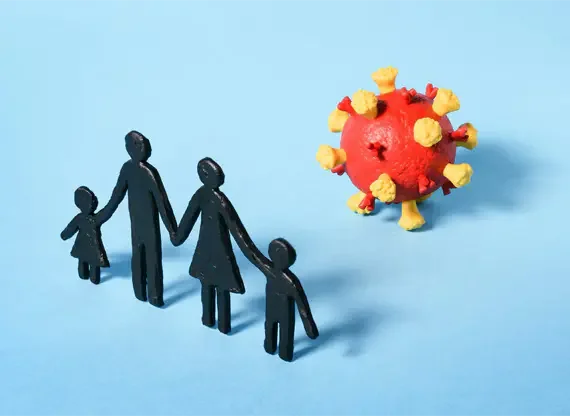
March 5, 2020
Money pays for safe housing, buys healthy groceries, affords a good education. But sometimes it doesn’t. Or it can’t. Because there isn’t enough of it to go around. And this is when income and healthcare become inextricably intertwined, setting into motion a feedback loop between poverty and chronic disease that only targeted and widespread distribution of resources can break. Public health initiatives, robust data sets, and technology to connect it all helps, but in the wake of COVID-19, the ecosystem relies on a few new players too, like private citizens and increased access.
When we talk about the Social Determinants of Health what we’re really getting at is that there are critical health risks associated with economic insecurity. The World Health Organization reports that “the poor are more vulnerable to chronic diseases because of material deprivation and psychosocial stress, higher levels of risk behaviour, unhealthy living conditions, and limited access to good-quality health care.” Today over 60% of Americans live with a chronic condition and 40% live with more than one. Drilling down a bit further, cardiac disease in particular accounts for 1 in 3 deaths in the United States and remains the number one cause of death globally. The downstream effect of which includes a number of inefficiencies to the larger healthcare system (high utilization of the most costly services, like the Emergency Room, for example), to the economy (sick people are less able to work consistently and thus lose out on income opportunities), and more to the point, creates a sicker population overall.
And now, as COVID-19 is sweeping the globe, we are forced into a new awakening. “While the virus doesn’t discriminate, the conditions in which it spreads do” comments Hannah Gold, reporter for The Cut. The conditions she is referring to include lower income communities and vulnerable populations, where chronic conditions thrive. COVID-19 has, from the start, shown higher fatality rates for those with respiratory and cardiovascular conditions such as chronic Heart Disease, COPD, Diabetes, Hypertension, Obesity, and Asthma.
And as if the health threat of COVID-19 isn’t bad enough, the economic projections are worse. Seventy-eight percent of Americans are already living paycheck to paycheck. The slip into poverty after missing a single paycheck is rapid. Below, we talk through a few of the basic social needs that matter greatly to chronic disease management and that are exacerbated by the threat of COVID-19.
Food | The science of food is far too vast for us to get into here, but generally speaking, a healthy, fresh diet is good and a poor, processed diet is bad. And there may be some truth to the notion that a healthy diet is more expensive: a 2013 Harvard study found that a proper diet made up of fresh foods actually costs $1.50 more per day than one made up of greasy foods. These cost disparities translate to health disparities too: 45% of cardiac, stroke, and diabetes deaths in a 2012 study were directly connected to poor diet. Healthy or unhealthy aside, in the context of a global pandemic, a lack of disposable or flexible income to buy any amount of food in bulk means that already risky trips to the grocery store become more frequent. To be sure, the financial impact of all this to the health care system, especially during a pandemic, is definitely more than $1.50 per day.
Housing | Housing conditions aren't always ideal in the best of times, let alone when mandated to stay in them for an undisclosed amount of time. Forty percent of homes in American metro regions have one or more health or safety hazards: mold, mildew, poor ventilation, mites, etc. Colder homes have in fact been associated with increased risk of cardiovascular health. Chronic conditions are exacerbated by substandard living conditions and simultaneously place these people at increased risk for COVID-19. And lets not forget people who don’t have stable housing at all: over 560,000 people lived in homelessness in the US in 2019 on any given night. A lack of sanitation resources, means these populations couldn’t wash their hands for 20 seconds with soap and water if they tried.
Isolation | We’re social creatures and mandated isolation is simply abnormal. As the world adjusts to the new work-from-home lifestyle, feelings of loneliness increase. Research has shown that loneliness can not only lead to premature death via cardiovascular disease, but is even equivalent to smoking 15 cigarettes per day. Virtual happy hours or virtual family dinners help to ease the tension, so it is worth mentioning that access to connectivity is a privilege. As many as 80 million households lack broadband connectivity.
Health is not separate from our lives but integral to every element of it. This becomes ever resonant during a global pandemic when everything we hold sacred is at risk and the threads our basic needs hang upon - employment, safe spaces to shelter in place, access to food, mental health - are snipped away. “Nothing could be worse than a return to normalcy,” author Arundhati Roy states in her recent essay. Indeed, we are at a crux of a forced reimagination of our world and of our species. The imperative of today, according to McKinsey, is how to (1) protect our lives and then to (2) protect our livelihoods. As of this writing, 1,682,220 cases of COVID-19 have been reported globally, 49,814 are in critical condition, and 101,983 didn’t make it. In the US alone, 16 million people have filed for unemployment, begging the question of how a post-COVID world might look. If there is an opportunity within this crisis it might be that the stage has been set for a health care revolution, the kind industry experts have been egging along for years. This would be a significant shift for the industry, both in the receptivity and minds of consumers and as a reorientation of our collective priorities in which we create a future that is equitable and centered on human dignity.
At Bayer G4A we are launching a Partnership effort to tackle some of the most pressing challenges in health, from chronic condition management to heart disease and more. Become part of the solution at G4A.health.

Grace Moen,
Writer, Digital Health